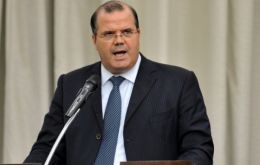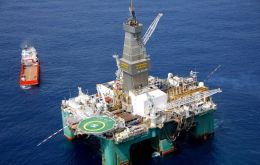MercoPress. South Atlantic News Agency
Economy
-
Monday, November 2nd 2015 - 09:30 UTC
Petrobras largest union on strike protesting sale of company's assets

Brazil's largest oil union began an open-ended strike on Sunday, protesting against attempts by the government to shrink the state-run oil company Petrobras, which is reeling from a corruption crisis and a crash in the oil price.
-
Monday, November 2nd 2015 - 09:18 UTC
China's Renmimbi has become world's second most used currency in trade finance

As China establishes itself as the world’s second largest economy and top trading nation, its currency, the renminbi (RMB), is also gaining popularity around the world. According to the People’s Bank of China’s 2015 Renminbi Internationalization Report, the RMB was the world’s 5th most used payment currency, the 2nd most used trade finance currency, and the 6th most traded currency in 2014.
-
Monday, November 2nd 2015 - 08:43 UTC
Brazilian central bank opposes using the country's US$ 370bn reserves

Brazil's central bank chief, Alexandre Tombini, told lawmakers he opposes using the country's $370 billion foreign reserves at this moment as they serve as an insurance policy for Latin America's largest economy.
-
Saturday, October 31st 2015 - 09:40 UTC
UK and Brazil committed to exchange of EU/Mercosur market access offers by end of 2015

The United Kingdom and Brazil reaffirmed on Friday their support for the success of the European Union/Mercosur Association agreement negotiations in the framework of the eighth meeting of the UK-Brazil Joint Economic and Trade Committee (JETCO) which emphasizes bilateral cooperation and initiatives.
-
Saturday, October 31st 2015 - 07:04 UTC
Griesa accepts 'me too' claims and raises Argentina's bond debt to US$ 9bn

US judge Thomas Griesa on Friday accepted the priority repayment claims of hundreds more Argentine bondholders who did not join a huge debt restructuring. The ruling, on 49 complaints representing debt worth $6.1 billion, added fresh pressure on Buenos Aires which has refused to pay off two hedge fund creditors that already won court support for their claims.
-
Saturday, October 31st 2015 - 06:42 UTC
Unemployment in recession-hit Brazil climbing: 8.8 million looking for jobs

Unemployment in recession deep Brazil climbed to 8.7% of active population in the quarter ending last August, the government said Thursday. The indicator shows a steep hike from the 6.9% recorded in August 2014, according to statistics of the National Study of Households (PNAD), published by the state Brazilian Institute for Geography and Statistics (IBGE).
-
Friday, October 30th 2015 - 08:09 UTC
New Zealand rejects controversial sale of iconic dairy farm to Chinese company

Chinese conglomerate Shanghai Pengxin Group has been on a buying spree ever since it entered New Zealand in 2011. The food giant has bought 29 farms through local subsidiaries to become the country's third largest dairy producer.
-
Friday, October 30th 2015 - 07:39 UTC
US growth slows sharply in the third quarter; consumer spending strong at 3.2%

United States growth slowed sharply in the third quarter of the year. GDP grew at an annualized pace of 1.5% between July and September, according to the Department of Commerce, down from 3.9% in the second quarter. The slowdown was partly due to companies running down stockpiles of goods in their warehouses.
-
Friday, October 30th 2015 - 07:35 UTC
Venezuela central bank gold holdings drop 19% in four months

Venezuela central bank gold holdings declined in value by 19% between January and May, according to its financial statements, likely reflecting gold swap operations and lower bullion prices. The country has been struggling with stagflation due to low oil prices and a collapsing state-led economic model, holds a considerable portion of its monetary reserves in gold.
-
Friday, October 30th 2015 - 06:37 UTC
Falklands' Humpback well finds non-commercial quantities of oil and gas

Humpback is the first well to encounter oil in the potentially larger systems in deeper waters off the southeast of the Falkland Islands; however the oil and gas across a number of reservoir targets in the well drilled to a depth of 5.136 meters, were in non-commercial quantities.
